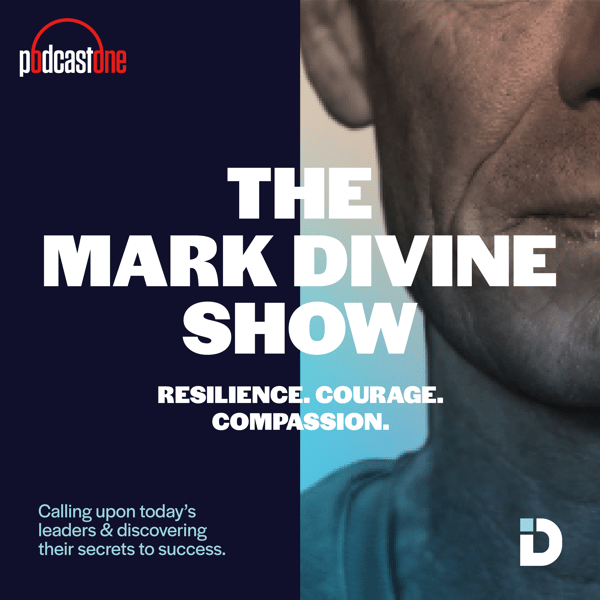Insight into the Brain and Resilience
The Mark Divine Show
Mark Divine
4.8 • 1.7K Ratings
🗓️ 5 August 2021
⏱️ 64 minutes
🧾️ Download transcript
Summary
Transcript
Click on a timestamp to play from that location
| 0:00.0 | When a bad thing happens, you can either let it destroy you, define you, or strengthen you. |
| 0:15.0 | Choose wisely. |
| 0:18.0 | Hey folks, this is Mark Devine. Welcome to the Andeal Mind Podcast. Thanks so much for joining me. |
| 0:31.0 | I've got an exciting guest today, Dr. Rahul Jandiel. Perfectly said, brain surgeon neuroscientist, UCSD guy, dad, dead, author of an incredible book, Life on a Knife's Edge. |
| 0:45.0 | A brain surgeon's reflections on life, loss, and survival. I'm super stoked to talk to you. Thank you for being here in person. |
| 0:51.0 | Thank you for having me. I'm a San Diego almost native. My sons were born here, so it's a pleasure to be back. Welcome. |
| 0:57.0 | When did you put this out just recently? About a month ago, yeah. Nice job. |
| 1:02.0 | Yeah, this is sort of my thing. I gave it my rocking review yesterday. I was like, I really, really want to go back and read the whole thing and dad. |
| 1:08.0 | Is your life story basically right? Yeah, thank you for recognizing that. It's a rare opportunity at Penguin. |
| 1:14.0 | Basically, it's a psychological memoir. The evolution of my thoughts and stuff like that through these experiences. |
| 1:20.0 | Did you pitch them or did you bring them on manuscript? Well, the way that worked was I had a book called Life Lessons from a Brain Surgeon, which was a title that they picked, Penguin UK, not Penguin US. |
| 1:37.0 | The US title was Neurofitness that felt too much like exercise, and it didn't have that cache. |
| 1:45.0 | But they changed it, and then it became a bestseller over there. Naturally, they wanted to do a second book, and I wanted to do something that sort of crossed several genres. |
| 1:57.0 | How do you speak about the mind only from the neuroscientists were only using one perspective? We need athletes perspective, we need soldiers perspective, we need parents who are grieving a child perspective. |
| 2:08.0 | I try to bring all those different stories in my performance, and moms, and parents going through different things, like what are the lessons from cancer patients? |
| 2:19.0 | Yeah, so they were like, this is wild. I wrote 300 pages, they said, this is 210 will be great, but that's what they do. They see it with fresh eyes, you know. |
| 2:32.0 | That's true. That's interesting. So you are both a brain surgeon and a neuroscientist. Those don't usually conflate into one career. |
| 2:40.0 | Yeah, and I did that. For my perspective, I did that both in San Diego, the brain surgery training, and the PhD right here at, you know, Tori Pines was where I did my lab work, and Hillcrest UCSD was where I did my neurosurgical training. |
| 3:00.0 | I mean, it was intense eight years in San Diego, and my wife had three sons, you know, so it was just a lot of growth. |
| 3:08.0 | What I'm curious is like, how did your understanding of, you know, the subjective side of neuroscience, you know, how personality is formed and how trauma affects a personality and whatnot. |
| 3:23.0 | How did that play into your work as a brain surgeon, where you're really just looking at the physical structure and saying, oh, look, I got to cut that piece of cancer out that doesn't belong there. How did that affect your thinking? |
| 3:33.0 | Well, you're asking me now at age 48 with this book, and it's partly why I was fortunate and lucky enough to share those thoughts in this book, but that's a whole 25 year journey from the first time I saw, you know, incision made, and you look at the substance of the brain, and it right away, you're floored. |
... |
Please login to see the full transcript.
Disclaimer: The podcast and artwork embedded on this page are from Mark Divine, and are the property of its owner and not affiliated with or endorsed by Tapesearch.
Generated transcripts are the property of Mark Divine and are distributed freely under the Fair Use doctrine. Transcripts generated by Tapesearch are not guaranteed to be accurate.
Copyright © Tapesearch 2025.

